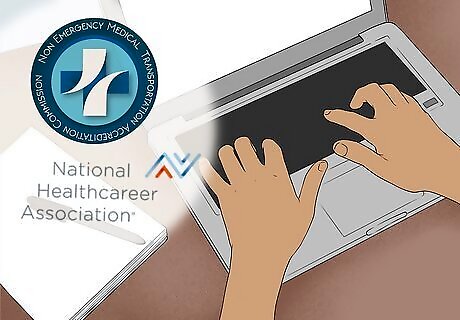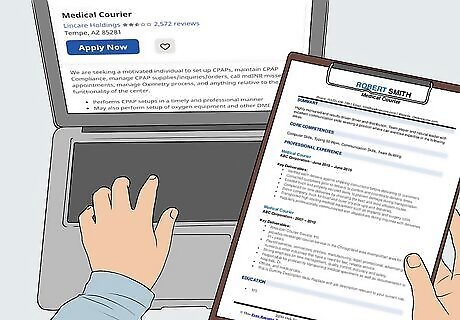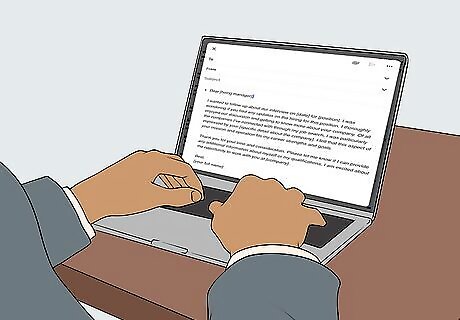
views
- Meet the basic qualifications for medical couriers. Requirements vary by company, but you must be physically fit with a valid driver’s license.
- Complete an accredited online training program for medical couriers. Pass the certification exam and complete additional certifications like HIPAA.
- Research local companies and apply for open medical courier positions. Prepare for questions like “What would you do if a pick-up is not ready when you arrive?”
How to Become a Medical Courier

Fulfill the required qualifications and skills. Before applying for a medical courier job, make sure that you’re eligible for the position. While specific requirements vary by location and by company, the most common qualifications for medical couriers are: Age: Being at least 21-years-old, or 18 in some cases. Driver’s license: Must be valid and with a clean driving record. Vehicle: Most medical courier companies require you to provide your own vehicle that has been registered, inspected, and is under 10 years old. Background check: Must be passed in addition to identity verification. Physical Fitness: Able to repeatedly lift, move, and transport up to 50 lbs of materials. Reasonable familiarity with the city you’ll be delivering in. Basic customer service skills. Ability to keep yourself organized and efficient.

Complete a medical courier training program online. Find an accredited and reputable program aimed at potential medical couriers. Look for programs that cover topics like hazardous materials training, medical terminology, and basic HIPAA requirements. In some cases, you can find a medical courier job company that offers in-person training or will pay for your online course as part of the hiring process. Research the medical courier companies in your area to find out if you should complete training before or after applying to jobs.

Get the required and recommended certifications. Medical courier certification is a huge asset when applying for jobs and negotiating higher pay. Certification is offered through online courses by organizations like the National Healthcareer Association and the Non-Emergency Medical Transportation Certification Commission. Pass the online certification exam by studying subjects like HIPAA regulations, medical terminology, safety protocol, and customer service skills. Certificates are typically valid for one to three years after the initial certification. At the very least, many medical transport companies require or recommend that employees get the HIPAA and Bloodborne Pathogen certifications.

Apply for medical courier jobs. Research reputable courier companies or medical laboratories in your area and see if they have job openings. Medical courier jobs are also often posted on job boards like Glassdoor and Indeed. Write or update your resume and submit applications in person or online. Thoroughly read through the application requirements and include all documents the company has requested. You may also have to include a copy of your driver’s license, car insurance, and certification in your application. Many medical couriers are independent contractors, meaning they work for courier companies on a contract basis rather than as a full-time employee. If you want to be a self-employed contractor instead of working full time for a courier company, register with courier service platforms like Medical Couriers that connect independent contractors with jobs.

Prepare for your job interview. If a company is interested in your application, they will invite you to an interview. Dress professionally and show up on time to the interview, whether it’s in-person or virtual. Prepare for your interview with responses for common medical courier interview questions like: What would you do if you knew you’d be late for delivery due to traffic? What would you do if a package was damaged during transit? What would you do if a pick-up is not ready when you arrive? How do you ensure the safe storage of medical items? What information do you look for to verify the correct recipient of a delivery? How do you ensure the timely delivery of an urgent medical item? What criteria do you use to determine the best route for a delivery?

Follow up after your interview. The day after the interview, send a brief email to the hiring manager thanking them for their time and mentioning one specific thing you learned about the organization during the interview. If you haven’t heard back about an offer after two weeks, follow up with a short and positive email to the hiring manager: Dear [hiring manager],I wanted to follow up about our interview on [date] for [position]. I was wondering if you had any updates on the hiring for this position. I thoroughly enjoyed our discussion and getting to know more about your company. Of all the companies I’ve connected with through my job search, I was particularly impressed by your [specific detail about the company]. I felt that this aspect of your mission and operation fits my career strengths and goals.Thank you for your time and consideration. Please let me know if I can provide any additional information about myself or my qualifications. I am excited about the opportunity to work with you at [company].Best,[your full name]

Accept the position and complete onboarding. Once offered a medical courier position, continue the same level of professionalism and dedication you showed throughout the hiring process. Keep your certification up to date with the mandated continuing education and training requirements. Your company may remind you about newly required training and certifications or provide them for you. If you’re an independent contractor, you're fully responsible for keeping your medical courier certification up to date.
What is a medical courier?

Medical couriers deliver medical supplies and lab specimens. They may also transport medical records, equipment, documents, test results, and medications between healthcare facilities, laboratories, and patients. Other duties and responsibilities of medical couriers include to: Deliver and pick up items on time. Safely pack and place all deliveries in the vehicle. Manage invoices, receipts, and other important documentation. Review and verify the accuracy of all transactions. Monitor the inventory of medical supplies and materials. Maintain the vehicle's safe conditions and registration. Coordinate with healthcare personnel for pick-up and drop-off. Properly and safely transport hazardous materials and body organs. Maintain the integrity and safety of all transported items. Comply with all safety regulations when handling hazardous materials, including sanitation and wearing appropriate personal protective equipment (PPE).
How much do medical couriers make?

Medical couriers make an average of $30,000 per year. $30,000 is the average salary for medical couriers throughout the United States, including tips and bonuses. However, the annual compensation for medical couriers varies from $17,000 to $51,500. The salary range for medical couriers is dependent on factors like location, education, experience, and employing company. The cities with the highest average salaries for medical couriers, as of January 2024, are San Francisco, CA ($46,500/year), Portland, OR ($39,000/year), and Seattle, WA ($37,000/year).
What are the benefits of being a medical courier?

The main benefit of being a medical courier is flexibility. Medical couriers can work independently and have control over their working schedules. They can choose their hours and, in some instances, can be their own boss. If they work as independent contractors, successful medical couriers can also choose the clients they work for.

Medical couriers benefit from job security and growth. Being a medical courier is an in-demand job, with the field expected to see a 5.55% revenue increase by 2027 (as of 2023). Not only will medical couriers likely be able to hold on to their jobs long-term, but they also are likely to have salary growth over the next few years.

Being a medical courier is a fulfilling career. Medical couriers play a crucial role in healthcare. They are entrusted with safely and promptly delivering medical supplies and organs to patients and doctors who need them. Every medical courier can benefit from knowing that their work is important and essential.




















Comments
0 comment